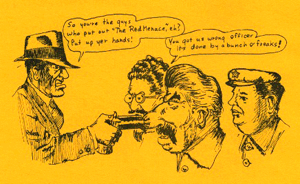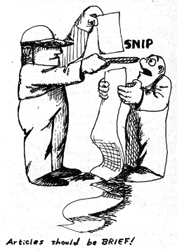|
What is The Red Menace?
The Red Menace is published by Toronto Liberation School. Toronto Liberation School is a group of liberation socialists, independent of any political organization, who see a need for a broad range of educational and cultural activities that contribute to transforming this society. We see the constituency for these activities as all those people who have become concerned about their lives, their communities, and the problems of this society and its institutions; people who have become activists at the workplace or in the community, for their needs and rights, or around national and international issues; people struggling for their liberation. We believe that liberation requires a fundamental restructuring of social and economic relationships, suited to the needs of all people rather than only to those of the few. This we would call "socialism", but by it we mean neither the band-aid reformism of the NDP nor Russian-style totalitarianism. Socialism to us is possible only through the self-activity of working people towards a completely democratic society. Toronto Liberation School hopes to contribute to this in any way that it can. In the past, we have put on lectures, courses, and helped to organize a conference on Popular Education, and participated individually and collectively in a range of political activities. We see this newsletter, The Red Menace, as one part, but by no means the only part, of our political practice and development.
II The Red Menace is not a theoretical journal. It is not a mouthpiece for the correct line of political sect. What it is is a newsletter, an organ of communication. Not a one-way conveyor of communication, from a few theoretical "heavies" to the unwashed masses, but a vehicle of encouraging vigorous participation from as many people as possible. (In some ways, we look back to the early development of modern science, when there was dynamic, anarchic, and marvelously efficient, exchange of ideas and information between scientists in different countries through the exchange of 'news letters'). Theory and writing have to be de-mythologized. Thinking about society and how it could change is something that everyone does. And no one has all the answers. We don't just want to print long, dry, ponderous articles. We are at least equally interested in brief, to-the-point comments on various problems. A one-page observation on some specific issue or idea is more valuable than a 15-page article that is academically competent, but has nothing new to say. Nor are we looking for "definitive statements" on particular topics. We are much more interested in the tentative, the exploratory, the contribution, of someone who is unsure of what s/he says, but is willing to air it to the comments of others. So please put your thoughts on paper and send them in. We are interested in: · articles about where you work, where you go to school,
where you live, where you shop, where you play Oh yes - we need money, of course. Money to keep this newsletter
going, especially since we are trying to distribute them free as
much as possible. A dollar or two will help, five or ten dollars
would be really nice. If you are sending a cheque, make it payable
to Toronto Liberation School. And if you're involved in a publication
yourself, we'd be glad to trade subscriptions. III The Red Menace, as the name implies, is a sinister communist conspiracy of fanatical revolutionaries sworn to poison the fabric of our national life, extremists who will stop at nothing in their ruthless determination to undermine the moral values which are the bedrock of this society and its institutions. In the pursuit of their treacherous goals the agents of this Red Menace are willing to go to any length. Their aim is nothing less than the willful subversion and final overthrow of all that is most sacred in our precious free enterprise society: wage labour, exploitation, bureaucracy, authoritarianism, the nuclear family, even the state itself. The newsletter you are holding in your hand is put by a number of dupes, fellow-travellers, and conscious tools of this red conspiracy who have formed themselves together in an organization called Toronto Liberation School. Our intention is to use this newsletter, The Red Menace, as a mouthpiece for the conspiracy. This however requires the assistance of other people who agree with our objectives.
We would stress, first of all, for the benefit of prospective fellow-travellers, that this publication is a newsletter, not a journal or magazine. We in Toronto Liberation School do not want to be the editors of a product which will be passively consumed by readership. What we intend, rather, is that The Red Menace be a vehicle of communication between independent socialists in Canada, a forum in which there can be discussion of experiences, strategy, and theory. It is a project for which we seek the active participation of as many people as possible across Canada. Our decision to publish The Red Menace stems from our understanding of the current state of the independent left in Canada. It is a situation where there is widespread and diverse activity, on the one hand, and a significant degree of isolation and strategic confusion, on the other. There are some who do little except talk and theorize, and others who are very active, but reflect very little about what they are doing, and why. Few groups have a developed class analysis of the situation in Canada itself. Many are oriented exclusively to the Third World, doing solidarity work, which is valuable, but which can hardly be the main activity of a socialist movement in Canada. Few groups have a perspective or strategy for their own development; most have little sense of where they are going. Yet the independent left is a positive phenomenon. There are now many groups and individuals across Canada who are committed to a politics based on marxism, who have rejected any temptation to withdraw from political activism, and who have similarly rejected the spurious alternative of joining one of the innumerable "vanguard" sects. Among many (although certainly not all) of the groups and individuals of the independent left there at least implicit rudimentary agreement around certain fundamental questions of revolutionary politics. This unity has however tended by and large to be implied, or expressed by practice alone; this why it has remained implicit, rather than being made explicit. This in turn has set sharp limits on the extent to which this basic unity could be developed and elaborated. The failure to confront strategic and political questions on the part of much of the independent left may be partially explicable by the basis of unity on which many left groups currently exist. Coalitions of people with different political viewpoints, they have avoided debate for the sake of self-preservation, for frank discussion might easily uncover political differences that would threaten the viability of some organizations. Yet this failure to probe political questions in a serious way has imposed a handicap that is often stifling: an inability to collectively develop perspectives and directions. It also means that the independent left, the product of social movements which marked a radical departure from the "old left" and its politics, has nevertheless largely failed to assimilate the lessons of those social movements, of the new left, the women's movement, etc., as well as the traditions of a wholistic, critical, libertarian marxism. As long as it fails to do so, its prospects are problematic indeed. These problems are neither surprising nor especially blameworthy given the degree of isolation, from each other and from the working class, in which so many groups operate. Fundamentally this isolation is an expression of the level of class struggle in Canada. It cannot be wished away or arbitrarily overcome by organizational measures or by finding the "correct" strategy. Organization and strategy are not universally applicable formulae that are "discovered" by some clever theoretician steeped in the marxist classics and then applied everywhere: they are ways of exploiting, as much as possible, and as realistically as possible, the options which are presented by a particular moment of the class struggle. They constantly have to be re-evaluated, adapted, and amended in the light of particular circumstances and changed situations. The vision of "the" strategy is a mirage. But nevertheless, it is our belief that the level of political activity permits more initiatives, in terms of organizational links and in terms of development of strategy and theory, than are presently being developed. Hence The Red Menace. One of the most important needs which we see this newsletter responding to is therefore the simple one of overcoming isolation, for more communication within the independent left. In this process of communication, one of the most important priorities must be the sharing and criticism of political experiences and activities. This could involve, for example, a particular collective describing and analyzing a project, organizing campaign, or whatever, that it has been involved in. The purpose would not be simply to convey information about what is being done by various groups (although this can be useful in itself) but to encourage critical evaluations of various forms of left practice, and the theory underlying it. This evaluation would come in the first instance from people describing their own work and using the opportunity to reflect critically on what they have been doing. Response from others in the pages of this newsletter could then potentially comprise a positive ongoing discussion of the experience being considered and of related activities. A process of constructive criticism should help to develop the habit of looking at individual projects in a larger strategic, political, and theoretical context. It should also make it more common for revolutionaries to draw lessons from their practice and to learn from each other, so that positive lessons are generalized and negative ones not repeated over and over again. This is clearly something that can occur only with established communications links. At the same time, in this way we can (and must) avoid the rigidities of the Leninist form of organization which seeks to subject everyone to a uniform "line" and centralized discipline, which seeks to guarantee political unity by organizational measures. Another priority of the newsletter, related to the first, will be similar discussions of experiences at work, at school, in the community, at play, and in other activities which constitute daily life in this society. It is our belief that marxist politics must deal with not only the 'high politics' of governments, monetary crises, wars, etc., but also with the politics of ordinary life, the level at which the oppressiveness of capitalist society is experienced by most of us on the day-to-day level ("The critique of daily life"). We believe that it is crucially important that Marxists analyze this level of reality with same energy that they have traditionally given to the affairs of states and capital, and that they incorporate this analysis into their strategy. An emphasis on specific analysis of specific situations should make it possible to broaden participation in this political exchange, so that not only the "theoreticians" take part, but also those who now participate little or not at all in the formal development of concepts, strategies, theories, etc. The newsletter will be strongly committed to aiding the democratization of the political process within the left, a matter not only of formal principles but of practical utility, for the left needs to engage the minds and imaginations of all its members. Another priority of The Red Menace will be the project of developing a coherent political perspective, partly out of these different examinations of experience, but also through discussions of theoretical, strategic and organizational questions. Our purpose, after all, is not communication for its own sake, but the stimulation of a definite political process toward definite political goals. Accordingly, we approach this project of a newsletter with a certain set of political attitudes and beliefs. This is not the place to set out our ideas in great detail: this is not a manifesto. Indeed, to be honest, at this point we in the TLS collective have worked out our ideas in much less detail and with much less sophistication than we would wish, although we believe that we have progressed in the right direction. The content of The Red Menace from issue to issue will necessarily be the best indication of our politics. Hopefully the interchange in its pages will cause us to deepen, re-affirm, and change the ideas we carry to it at the outset. But we do not intend that this newsletter reflect a single political line, not only because we do not believe that a coherent and comprehensive "correct line" exists but more importantly because we believe that a necessary condition, and pre-condition, of libertarian politics is the widest and most open discussion. We cannot consider any questions closed. And certainly there will be many times when we print contributions that we do not ourselves agree with. At the same time, we consider it neither possible nor desirable to throw open the pages of The Red Menace to all possible shades of opinion. The project we are committed is that of developing a libertarian marxism which takes as its project the critique of the totality of human life in capitalist society. This critique cannot simply content itself with generalities or with conclusions drawn decades ago in a world that was significantly different. To understand something means to understand it in detail, in historical context, and in all its complexity. Based on this critique, we are committed to developing a revolutionary politics that is liberatory in the fullest sense of the word. Capitalism is a totalistic system of oppression that invades all areas of life: socialism must be the overcoming of capitalist reality in its entirety, or it is nothing. Or more concretely, a socialism that is partial can only become a parody of the liberatory ideals it espouses. The disastrous results of a "socialist" movement that equated socialism with nationalization of industry speak clearly enough in this regard. Our belief in a total revolution impels us to underline the assertion that Marx made the first point in the statement of principles of the First International: "The emancipation of the working classes must be achieved by the working classes themselves." Nationalization to be sure can be carried out by a vanguard party installing itself in the state power. Social liberation, human liberation, however, is a process that must go to the root. It cannot be decreed. Nor can it be achieved without the participation of the vast majority of the population. A collective project, and therefore individual, as well, socialism must be self-liberation in every sense of the word. We in TLS hope to contribute to this project because our own lives are shaped and misshaped by our capitalist reality. Whatever contribution we make will stem from our role as participants in a great human adventure, not from any self-proclaimed standing as the "vanguard of the proletariat" or any such reactionary nonsense. We do not consider it a priority to engage in lengthy debate with those whose political identification is with the corpse of Bolshevism. But The Red Menace will concern itself with some of the elements of Leninist theory and practice, not for themselves, but because they are based on principles which most of the independent left has not sufficiently analyzed. Without fully understanding these mistakes, it is impossible to develop a Marxist politics which avoids them. "The traditions of all the dead generations weigh like a nightmare on the brains of the living". Such critique is especially important since these encrusted orthodoxies tend to dominate much of left discussion through their controlled presses and the sheer volume of the noise they generate. They do not convince, but often they manage to deaden thought or disrupt or prevent intelligent public debate with their incessant "interventions". We will also seek to foster critical discussions of other theories and tendencies on the left which pose important issues for a revolutionary movement in Canada. We hope that the kind of discussion we envisage will enable the newsletter to contribute to a process of political unification on the independent left in Canada. In this, we differ from those who propose that various organizational ties be created to pull different groups together, that we should all "get together" now. We believe that this latter kind of unification is a rather mechanical approach to the problem which would almost inevitably come to grief because it sees the process only in organizational terms. Political problems cannot be solved by organizational measures. Lasting organizational unity is possible only where there is fundamental agreement on questions of theory, principles, and strategy. And to assume that such agreement exists at present is to blind oneself to reality. Indeed a number of groups united primarily around practical tasks are finding it difficult to develop further because the requisite common political outlook is lacking. For them, the alternative may be a choice between relative stagnation resulting from inability to develop politically (or fear of doing so), and attempts at political development that result in polarization and splits. We do not think that it is a service to anyone to be over-hasty in trying to create organizational links. Such links should grow, not from an a priori belief in the virtues of bigness or centralization, but from the actual needs of the groups concerned. We should create whatever structures are needed to accomplish agreed-on and clearly defined common tasks. Such pragmatic links, if accompanied by conscious efforts to discuss issues of common political concern, whether they be the mutual critique of practice, or theoretical discussion, and stimulate a process of political drawing together that is organic and rooted in real situations. Some people disagree. They want to "get on with it" and be done with all the talk. However, we cannot accept the often assumed idea that everything has been said and that for socialists now it is just a matter of doing things. Most of us have been involved in enough groups that demand frantic activity but little thought to be wary of such an orientation. We are similarly wary of those who fail to recognize that theoretical practice is also a form of practice, a form that is quite important at the present time. We think that the socialist movement in Canada faces many unanswered questions (indeed, many unasked and unformulated questions) that have to be dealt with before we can progress significantly. Not least among those questions are "What is socialism?" and "Why does a socialist revolution seem so distant?" That the level of discussion on the left is so dismally low is an indication of how much socialists, like everyone else, are alienated from their own intelligence: so many people want ready-made answers, but are unwilling to think things through for themselves. For us, one of the implications of marxism is the conception that there is a close link between form and content in political work. Consequently we will endeavor to pay close attention to form in The Red Menace. We will persistently try to encourage the use of plain language rather than left jargon, and try to foster the ability to express complex ideas in as simple a way as possible without losing the meaning. We also use graphics, cartoons, etc. as much as we can given the rather severe limitations of the newsletter format. As much as possible, we want to use The Red Menace as a medium with which we can experiment, in which we can try to develop different ways of getting our point across as effectively as possible. This too should be an area which radicals can learn from each other (and from non-radicals). Hopefully we can develop livelier forms of communication that can be used in our political work. Accordingly, we will sometimes be guilty of poetry, satire, having fun and similar violations of political orthodoxy. There should be no reason why marxist politics have to be as deadly and dull as they generally tend to be. The task is serious, but creatively, playfulness and humour are resources that we must learn to draw on in our struggle for a socialist future. Their repression is itself one of the indictments of capitalism, and of any politics that fail to combat that repression.
It is impossible to stress enough that the flowering of creativity demanded by a revolutionary socialist politics demands the widest possible participation. By this criterion, the project of The Red Menace, modest as it is, will be a failure if it doesn't win the active involvement of considerable numbers of the people who receive it. This is especially so because we are not a theoretical journal in the traditional sense. We are not terribly interested in seeking out articles that are the definitive last word on some particular topic (though if you do happen to have such a definitive interpretation of the world, we would be happy to see it.) We are more interested in fostering an orientation to theory and strategy and tactics that rejects the idea that these are the exclusive preserve of theorists, strategists, and tacticians. Everyone has something to contribute to these questions, if not in the same degree. Our task is to create an environment where such contributions are drawn out, and where we all learn to get the maximum benefit from them. This means that theory has to be de-mythologized. Theoretical practice is not only the writing of books and articles, important as that may be. It is also drawing conclusions from various situations, making generalizations on the basis of one's experience and intellectual resources. This is not necessarily a grandiose undertaking: a one- or two page comment making one or two basic points about some particular topic, experience, or problem is often more useful than a long treatise that is read by almost no one, and says nothing new at any rate. A tentative exploration of a problem is often valuable in provoking further thought: there is no reason to insist that people have to have fully thought our all aspects of a problem before they venture an opinion on some part of it. One consequence of this is that we will try to maintain a definite bias in favour of brevity in The Red Menace, although we will undoubtedly make exceptions. But it is less necessary to encourage the self-confident theoreticians than those who don't think of themselves that way, so we are "bending the stick the other way" with an extra stress on the importance of short comments, feedback, letters, and the like, in the process of dialogue that we are seeking to develop in The Red Menace. The purpose of this introduction is to open discussion, not to close it with definitive pronouncements. So it will end here. A fuller definition of what this newsletter is to be will have to emerge from its practice. And that will be determined by those who participate with us in this project.
Published in Volume 1, Number 1 of The Red Menace, February
1976. See also: A Political Statement of the Libertarian Socialist Collective.
|



